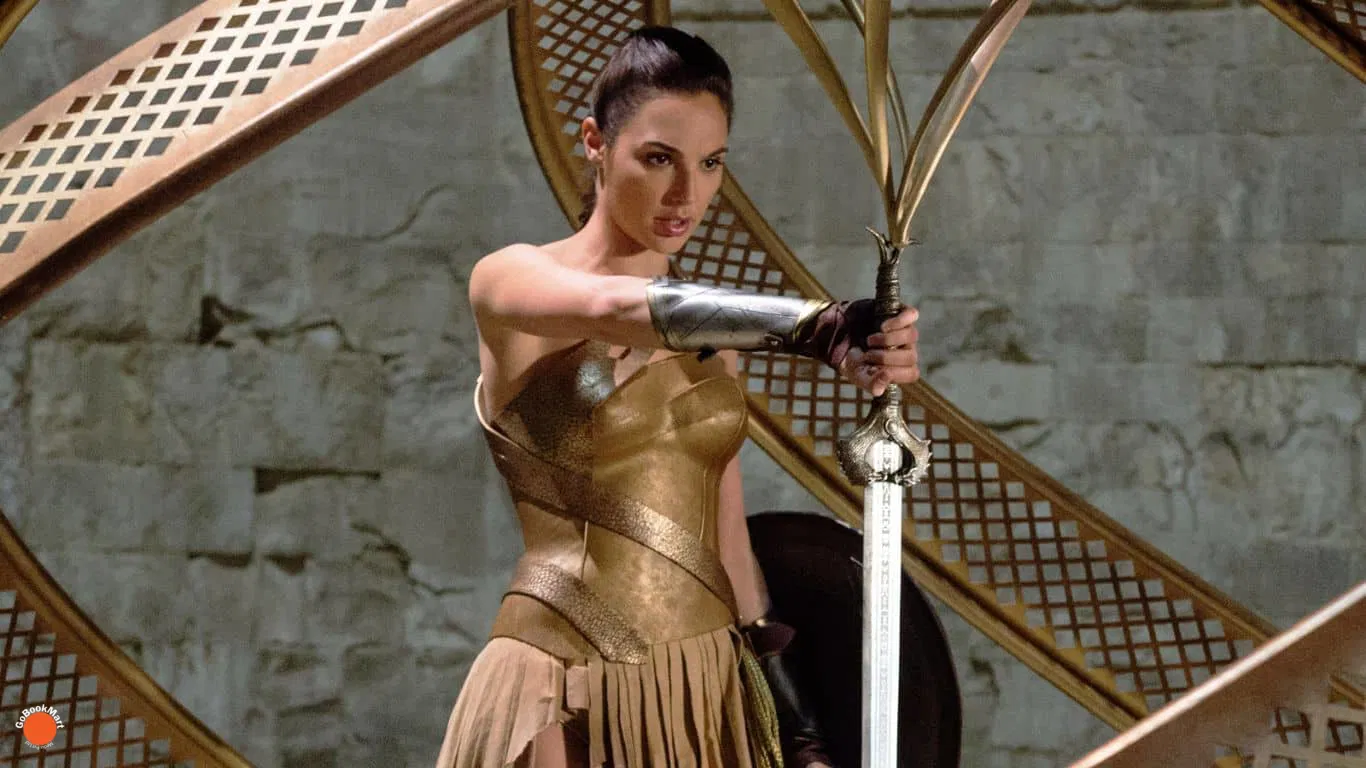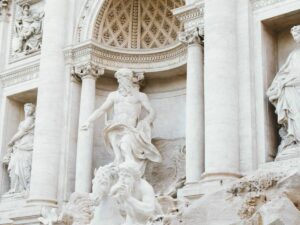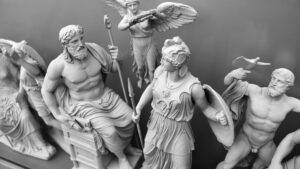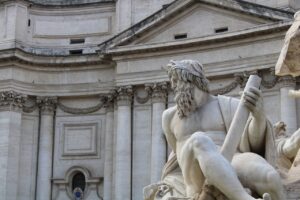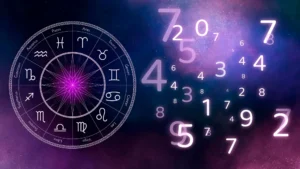Greek mythology is more than just a collection of ancient stories about gods, heroes, and monsters. It’s a vibrant thread woven into the fabric of modern culture, shaping how we tell stories, design buildings, name brands, and even understand ourselves. From blockbuster movies to everyday phrases, the echoes of Zeus, Athena, and Hercules resonate in ways you might not even notice. Let’s dive into the timeless legacy of Greek mythology and explore how it continues to influence our world today.
Why Greek Mythology Still Matters
Greek mythology, born in the Bronze Age, was once a way to explain the unexplainable—storms, love, death, and destiny. These tales of gods and mortals weren’t just entertainment; they were a lens through which ancient Greeks understood their world. Today, these stories remain relevant because they tap into universal human experiences—courage, betrayal, love, and the struggle against fate. Their adaptability keeps them alive in our books, screens, and even our language.
A Timeless Connection to Human Nature
At their core, Greek myths explore what it means to be human. The gods, with their all-too-human flaws like jealousy or pride, mirror our own struggles. Heroes like Odysseus or Achilles face challenges that feel strikingly modern—think of Odysseus’s long journey home as a metaphor for anyone navigating life’s obstacles. These stories resonate because they’re not just about divine beings; they’re about us.
Greek Mythology in Literature
The influence of Greek mythology on literature is profound, stretching from ancient epics to today’s bestsellers. Homer’s Iliad and Odyssey set the stage for Western storytelling, introducing archetypes like the tragic hero and the epic quest. Modern authors continue to draw on these myths, reimagining them for new audiences while preserving their emotional depth.
Classic Works That Shaped the Canon
Homer’s epics, written around the 8th century BCE, are the bedrock of Western literature. The Iliad’s tale of the Trojan War and Achilles’s rage has inspired countless retellings, while the Odyssey’s journey of cunning and perseverance remains a template for adventure stories. These works introduced themes of heroism and fate that still define storytelling today.
Modern Retellings and Adaptations
Contemporary authors have breathed new life into Greek myths. Madeline Miller’s Circe reimagines the witch from the Odyssey as a complex, empowered figure, blending ancient lore with modern sensibilities. Rick Riordan’s Percy Jackson series transplants Greek gods into a modern American setting, making myths accessible to young readers. These adaptations show how flexible and relevant these stories remain.
Feminist Reinterpretations
Recent years have seen a surge in feminist retellings of Greek myths. Pat Barker’s The Silence of the Girls retells the Iliad from the perspective of Briseis, a woman caught in the war’s brutality. By giving voice to marginalized characters, these works challenge traditional narratives and highlight the myths’ enduring relevance to issues like gender and power.
Young Adult Fiction’s Mythical Boom
The Percy Jackson series by Rick Riordan is a cultural juggernaut, introducing a generation to Greek mythology through modern-day demigods. By setting Mount Olympus atop the Empire State Building, Riordan makes ancient tales feel immediate and relatable. This resurgence in young adult fiction proves that Greek myths can evolve without losing their core appeal.
Table: Notable Modern Books Inspired by Greek Mythology
| Title | Author | Mythological Basis | Modern Twist |
|---|---|---|---|
| Circe | Madeline Miller | Circe from The Odyssey | Feminist exploration of power and identity |
| The Silence of the Girls | Pat Barker | Trojan War (Iliad) | Female perspective on war’s impact |
| Percy Jackson Series | Rick Riordan | Greek gods and heroes | Modern-day demigod adventures |
| Mythos | Stephen Fry | Various Greek myths | Humorous, accessible retellings |
Greek Mythology in Film and Television
Hollywood and TV screens have long been enchanted by Greek mythology, turning ancient tales into visual spectacles. From epic battles to heartfelt dramas, these stories lend themselves to the screen’s ability to bring gods and monsters to life.
Blockbusters That Bring Myths to Life
Films like Clash of the Titans (1981 and 2010) and Disney’s Hercules (1997) have made Greek myths a staple of cinema. Clash of the Titans dramatizes Perseus’s quest to slay Medusa, blending myth with modern special effects. Disney’s Hercules, while taking liberties with the original story, captures the hero’s journey in a family-friendly format, complete with catchy songs and a lovable cast.
Television’s Mythical Renaissance
TV series have also embraced Greek mythology. Hercules: The Legendary Journeys and Xena: Warrior Princess in the 1990s brought gods and heroes to the small screen with campy charm. More recently, Blood of Zeus on Netflix offers a darker, animated take on Greek myths, exploring the lives of demigods in a richly detailed world. These shows prove that myths can adapt to serialized storytelling.
Pros and Cons of Mythological Adaptations in Film/TV
- Pros:
- Visually stunning depictions of gods and monsters.
- Makes myths accessible to wide audiences.
- Encourages interest in ancient stories.
- Cons:
- Often sacrifices accuracy for entertainment.
- Can oversimplify complex characters or themes.
- May perpetuate stereotypes (e.g., Zeus as a one-dimensional tyrant).
Greek Mythology in Art and Architecture
Greek mythology has left an indelible mark on art and architecture, from ancient sculptures to modern buildings. The gods and heroes of these myths have inspired artists and architects for centuries, creating a visual legacy that still shapes our world.
Mythology in Visual Arts
Artists have long drawn on Greek myths for inspiration. Sandro Botticelli’s The Birth of Venus captures the goddess emerging from the sea, a timeless image of beauty. In modern times, graphic novels like George O’Connor’s Olympians series bring myths to life with vivid illustrations, appealing to readers of all ages. These works show how myths continue to inspire creative expression.
Architectural Echoes of Ancient Greece
The neoclassical architecture of the 18th and 19th centuries revived Greek aesthetics, with buildings like the U.S. Capitol in Washington, D.C., featuring Corinthian columns reminiscent of the Parthenon. These designs reflect the democratic ideals of ancient Athens, linking mythology to modern governance. Even local courthouses often mimic Greek temples, evoking a sense of justice rooted in myth.
Comparison: Classical vs. Modern Mythological Art
| Aspect | Classical Art | Modern Art |
|---|---|---|
| Medium | Sculptures, pottery | Paintings, graphic novels |
| Focus | Idealized gods and heroes | Humanized, emotional portrayals |
| Examples | Parthenon friezes | Botticelli’s Birth of Venus |
| Purpose | Religious, cultural storytelling | Artistic expression, commentary |
Greek Mythology in Language and Idioms
You might not realize it, but Greek mythology is embedded in the way we speak. Phrases like “Achilles’ heel” or “Pandora’s box” are so common that we use them without thinking about their mythical origins. These expressions enrich our language and connect us to ancient stories.
Everyday Phrases with Mythical Roots
Many English idioms trace back to Greek myths. “Achilles’ heel” refers to a critical weakness, derived from the hero’s vulnerable spot. “Opening Pandora’s box” describes unleashing unforeseen troubles, inspired by the myth of Pandora’s curiosity. These phrases show how deeply mythology shapes our communication.
The Power of Mythical Metaphors
Beyond idioms, myths provide metaphors for life’s challenges. Calling a task “Herculean” evokes the demigod’s legendary strength, while “navigating a labyrinth” recalls Theseus’s journey through the Minotaur’s maze. These metaphors add depth to our language, linking modern experiences to ancient tales.
Table: Common Idioms from Greek Mythology
| Phrase | Mythological Origin | Modern Meaning |
|---|---|---|
| Achilles’ heel | Achilles’s weak spot (Iliad) | A critical vulnerability |
| Pandora’s box | Pandora’s jar of evils | A source of unintended troubles |
| Herculean task | Hercules’s labors | A daunting challenge |
| Trojan horse | The Trojan War | A deceptive strategy |
Greek Mythology in Branding and Marketing
Ever wonder why brands like Nike or Amazon sound so familiar? Greek mythology has infiltrated modern branding, with companies leveraging the power of ancient names and symbols to create memorable identities.
Mythological Names in Business
Nike, named after the Greek goddess of victory, uses her winged imagery to evoke speed and success. Amazon, inspired by the mythical warrior women, suggests strength and vastness. These names tap into the emotional resonance of myths, making brands instantly recognizable.
Mythical Symbols in Logos
Starbucks’ siren logo, inspired by the mythical creatures who lured sailors, blends Greek mythology with modern branding. Versace’s Medusa logo uses the Gorgon’s striking power to convey luxury and allure. These symbols show how myths can create a lasting impression in marketing.
Pros and Cons of Using Mythology in Branding
- Pros:
- Evokes strong emotional connections.
- Creates memorable, timeless brand identities.
- Links to universal themes like strength or wisdom.
- Cons:
- Risk of misrepresenting cultural heritage.
- May alienate audiences unfamiliar with myths.
- Overuse can dilute a brand’s uniqueness.
Greek Mythology in Psychology and Philosophy
Greek myths aren’t just stories—they’re tools for understanding the human mind. Psychologists and philosophers have long used these tales to explore human behavior, emotions, and morality.
Psychological Archetypes
Carl Jung’s theory of archetypes draws heavily on Greek mythology. Figures like Hercules (strength) or Persephone (transformation) represent universal patterns in the human psyche. The story of Narcissus, who fell in love with his reflection, inspired the term “narcissism,” showing how myths illuminate psychological concepts.
Philosophical Insights
Greek myths also shaped Western philosophy. Plato’s Allegory of the Cave echoes the myth of Prometheus, who brought knowledge to humanity at great cost. These stories explore timeless questions about truth, justice, and the human condition, influencing thinkers from Aristotle to modern philosophers.
Greek Mythology in Video Games
Video games have embraced Greek mythology, offering players immersive experiences with gods and heroes. From epic battles to narrative-driven adventures, these games bring myths into the digital age.
Immersive Mythical Worlds
Games like God of War and Assassin’s Creed: Odyssey let players explore Greek mythology firsthand. God of War casts players as Kratos, a Spartan warrior battling Olympian gods, while Assassin’s Creed: Odyssey recreates the world of ancient Greece with mythical creatures and quests. These games blend history and myth for engaging gameplay.
Educational Potential
Beyond entertainment, games can teach players about Greek mythology. Hades by Supergiant Games introduces players to the Underworld’s gods and myths through stunning visuals and storytelling. These games make learning about ancient stories fun and interactive.
Table: Popular Video Games Inspired by Greek Mythology
| Game | Developer | Mythological Elements | Gameplay Style |
|---|---|---|---|
| God of War | Santa Monica Studio | Olympian gods, Titans | Action-adventure, combat |
| Assassin’s Creed: Odyssey | Ubisoft | Trojan War, mythical creatures | Open-world RPG |
| Hades | Supergiant Games | Underworld, Greek gods | Roguelike, narrative-driven |
People Also Ask (PAA) Section
Here are answers to common questions about Greek mythology’s influence, drawn from real user queries on Google:
How has Greek mythology influenced modern culture?
Greek mythology shapes literature, film, art, language, and branding. From novels like Circe to phrases like “Achilles’ heel,” these ancient stories provide archetypes and themes that resonate today. They also inspire modern media, from movies like Clash of the Titans to games like God of War.
What are examples of Greek mythology in pop culture?
Examples include Disney’s Hercules, the Percy Jackson series, and video games like Assassin’s Creed: Odyssey. Brands like Nike and Amazon also draw on mythological names, while phrases like “Pandora’s box” are common in everyday speech.
Why is Greek mythology important today?
Greek mythology offers insights into human nature, morality, and universal themes like love and sacrifice. Its stories shape modern storytelling, inspire art and architecture, and provide psychological and philosophical frameworks for understanding ourselves.
Where can I learn more about Greek mythology’s influence?
Explore books like Mythos by Stephen Fry or The Greek Myths by Robert Graves. Websites like AncientPedia and Greek Mythology Worldwide offer detailed articles. Museums like the Metropolitan Museum of Art also showcase mythological art.
FAQ Section
Q: How does Greek mythology influence modern storytelling?
A: Greek myths provide archetypes like the hero’s journey and themes like fate versus free will, which shape modern novels, films, and games. Authors like Madeline Miller and game developers like Ubisoft draw on these narratives to create compelling stories.
Q: Are Greek myths still relevant in education?
A: Yes, Greek mythology is taught in schools to explore literature, history, and philosophy. It helps students understand cultural heritage and analyze universal themes, often through texts like the Odyssey or modern retellings like Percy Jackson.
Q: What brands use Greek mythology in their names or logos?
A: Brands like Nike (goddess of victory), Amazon (mythical warriors), and Starbucks (siren logo) use Greek mythology to create memorable identities. These names evoke strength, speed, or allure, resonating with consumers.
Q: How accurate are modern adaptations of Greek myths?
A: Modern adaptations often prioritize entertainment over accuracy. Films like Clash of the Titans may exaggerate or alter myths, while books like Percy Jackson modernize characters for accessibility. Some retellings, like Circe, stay closer to the original spirit.
Q: Can Greek mythology help with personal growth?
A: Yes, myths offer lessons on resilience, hubris, and morality. Stories like Icarus’s fall warn against overconfidence, while Odysseus’s journey teaches perseverance. Psychologists like Carl Jung use these stories to explore personal development.
Conclusion: The Enduring Power of Greek Myths
Greek mythology is no dusty relic—it’s a living force that shapes how we tell stories, design our world, and understand ourselves. From the pages of Circe to the screens of God of War, these ancient tales continue to captivate and inspire. They remind us that the struggles and triumphs of gods and heroes are not so different from our own. So, the next time you hear someone mention a “Herculean task” or spot a Nike swoosh, take a moment to appreciate the ancient stories still weaving their magic in our modern world.
Where to Dive Deeper
- Books: Read Mythos by Stephen Fry or The Odyssey by Homer for a deep dive into Greek myths.
- Online Resources: Visit AncientPedia or Mythology Titans for articles and insights.
- Museums: Explore mythological art at institutions like the Louvre or the British Museum.
- Games and Media: Play Hades or watch Blood of Zeus to experience myths in action.
